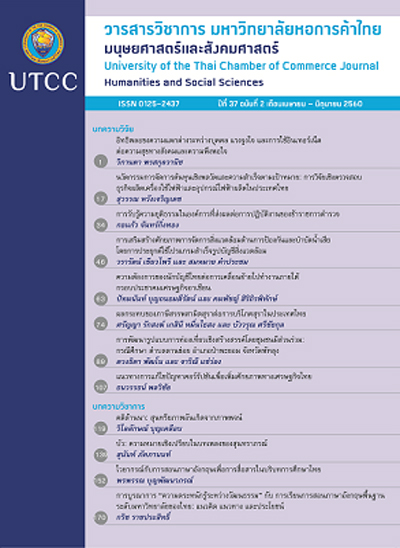The Unique Production Process of the Thai Section of NHK WORLD RADIO JAPAN
Main Article Content
Abstract
This article is a part of the research entitled “The Uniqueness of Program Production of NHK WORLD RADIO JAPAN, Thai Section”. The research was aimed to explore the uniqueness of the production process of the Thai language programs of NHK WORLD RADIO JAPAN and to understand how the Japanese producers and the Thai production staffs work together. This study is a qualitative research applying the methods of interview and in-situ observations at NHK WORLD RADIO JAPAN office in Tokyo, Japan including collecting data from NHK WORLD’s website and related documents from the Thai section of Radio Japan. The results indicated that there are five main stages of production process: 1. Creating an Idea and Planning, 2. Collecting Data for Preparation, 3. Script Writing, 4. Rehearsal, and 5. the On-Air stage. Japanese producer begins the process from the stage of Creating idea and Planning to the On-Air stage. The uniqueness of
Japanese producer’s work consists of three stages: (1) Write the script in Japanese first, translate into English for other foreign language sections including the Thai Section, then Thai specialist/ announcer translates it into Thai. (2) Japanese producer as the program director runs the Rehearsal by holding the “Discussion Meeting”, reads the script together with Thai staff in order to monitor and proof check the content validity, translation, pronunciation and time. (3) Japanese producer who is in charge of program director and controller continues to run the On-Air stage promptly after the Discussion Meeting
Article Details
ลิขสิทธิ์ของบทความ
ผลงานที่ได้รับการตีพิมพ์ถือเป็นลิขสิทธิ์ของมหาวิทยาลัยหอการค้าไทย ห้ามมิให้นำเนื้อหา ทัศนะ หรือข้อคิดเห็นใด ๆ ของผลงานไปทำซ้ำ ดัดแปลง หรือเผยแพร่ ไม่ว่าทั้งหมดหรือบางส่วนโดยไม่ได้รับอนุญาตเป็นลายลักษณ์อักษรจากมหาวิทยาลัยหอการค้าไทยก่อน
References
Chalermjirarat, V. (1988). Japanese style management (4thed.). Bangkok, Thailand: Dokya. (in Thai).
Chanvichai, K. (2005). The success of NHK’s television documentary program (Unpublished doctoral dissertation). Thammasat University, Bangkok, Thailand. (in Thai).
Crisell, A.(1994). Understanding radio (2nd ed.). New York, NY: Routledge.
Eusin, S. 2005. Teaching material of radio programme production unit 1. Nonthaburi, Thailand: Sukhothai Thammathirat Open University. (in Thai).
NHK, Public Relations Department. (2015). NHK annual report 2015/2016. Tokyo, Japan: Author.
NHK WORLD. (2015a). A history of international broadcasting from Japan, 80 years of NHK WORLD 1935-2015. Retrieved December, 16, 2015, from https://www.nhk.or.jp/intl80th/
NHK WORLD. (2015b). How is a program made: A case from the Arabic service. In A history of international broadcasting from Japan, 80 years of NHK WORLD 1935-2015, p.66-67. Tokyo, Japan: Author.
NHK WORLD. (2017a). Programme schedule. Retrieved March 5, 2017, from https://www.nhk.or.jp/nhkworld/th/radio/
NHK WORLD. (2017b). How is a program made: A case from the Arabic service. Retrieved March 5, 2017, from
https://www3.nhk.or.jp/nhkworld/en/chronology/service/radio01.html
NHK WORLD RADIO JAPAN. (2017). Service introduction [Brochure]. Tokyo, Japan: Author. (in Thai).
NHK WORLD RADIO JAPAN, Thai Section. (2017). Greeting voice from Radio Japan, Thai Section. Vol. 3/2560. Tokyo, Japan: Author. (in Thai).
Polnikornkij, V. (2015). Manual for being the radio producer and television newscaster (2nd ed.).Bangkok, Thailand: Office of Children and Youth’s Affairs. (in Thai).
Pornrungroj, C. (2014). Lerners’ identity: Educational institution’s uniqueness. Bangkok, Thailand: Office for National Education Standards and Quality Assessment.(in Thai).
Rawdkamdee, J. (1982). Radio program production handbook. Bangkok, Thailand: Chulalongkorn University, Faculty of communication, Mass Communication Division. (in Thai).
The Royal Institute. (2002). Thai dictionary of the Royal Institute 2002. Retrieved September 15, 2016, from https://www.royin.go.th/dictionary/search.php
Suwanwajokkasikij, J. (2013). The process of radio and television programming and production.Bangkok,Thailand: National Broadcasting and Telecommunication Commission. (in Thai).
Thiengburanathum, W. (1998). English-Thai dictionary. Bangkok, Thailand: Se-Education.(in Thai).
Uttamachan, V. (1998). Mass media in Japan (2nd ed.). Bangkok, Thailand: T.P. Print. (in Thai).
Uttamachan, V. (2001). Media for society reform: Key concept and lessons from various countries. Bangkok, Thailand: Chulalongkorn University Press. (in Thai).
World Radio and Television Council. (2001). Public broadcasting why? how?. Retrieved April 1, 2015, from https://unesdoc.unesco.org/images/0012/001240/124058eo.pdf
Youichi, I. (2006). Some trends in communication research and education in Japan. In Global trends in communication education and research, pp.115-131. Tokyo, Japan: NHK. Retrieved January 4, 2015, from https://eds.b.ebscohost.com.ezproxy.utcc.ac.th/eds/pdfviewer/pdfviewer?vid=2&sid=c2b347f1-18ab-4f86-99ba-647d79001226@sessionmgr4010


